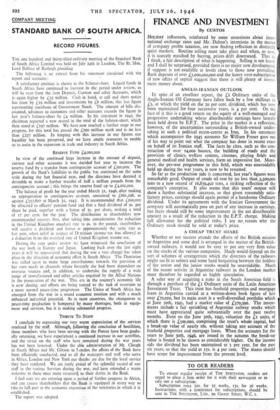FINANCE AND INVESTMENT
By CUSTOS
HOLIDAY influences, reinforced by some uneasiness about inter- national exchange rates and Mr.\ Dalton's intentions in the matter of company profits taxation, are now finding reflection in distinctly quiet markets. Routine selling must take place and when, as now it is scarcely matched by buying, prices drift downward. That is, I think, a fair description of what is happening. Selling is not heavy and I shall be surprised, provided there is no major new development, if support is not, available at levels close to those now prevailing. Bank deposits of over £5,000,000,000 and the heavy over-subscription of new offers of capital suggest that there is still plenty of invest- ment money about.
ANGLO-IRANIAN OUTLOOK
In spite of an excellent report, the Li Ordinary units of the Anglo-Iranian Oil Company have fallen back by a few shillings to £5, at which the yield on the 20 per cent. dividend, which has now been maintained for four successive years, is 4 per cent. On the face of it this is a good return on the equity of a well-managed and progressive undertaking whose distributable earnings have latterly been held down by E.P.T. The price in the market is a reflection, however, of the uncertainties surrounding a British-owned under- taking in such a political storm-centre as Iran. In his statement which accompanies the 1945 accounts Sir William Fraser goes out of his way to point out what the company has done in recent years on behalf of its Iranian staff. The facts he cites, such as the con- struction of over x4,000 houses, the building of roads and the provision of clinics, welfare centres, cinemas, playing fields and general medical and health services, form an impressive list. More- over, the pre-war programme in this field, which was unavoidably held up during the war years, is now to be resumed.
So far as the production side is concerned, last year's figures were remarkably good. Output of crude oil rose by no less than 3,50o,000 tons to a new record of 16,839,490 tons, a striking reflection of the company's enterprise. It also seems that this years' output will show a further substantial increase, so that given reasonably satis- factory prices, earnings should again permit of a handsome Ordinary dividend. Under its agreements with the Iranian Government the company will automatically pass on part of any increase in earnings, but. there should still be some improvement in the net distributable amount as a result or the reduction in the E.P.T. charge. Making full allowance for the political risks, I see no, reason why the Ordinary stock should be sold at today's price.
A, CHEAP TRUST SHARE
Whether or not success attends the efforts of the British mission to' Argentina and some deal is arranged in the matter of the British- owned railways, it would not be easy to put any very film value on the stocks of the various companies. Much would depend on the sort of schemes of arrangement which the directors of the railways might see fit to submit and some hard bargaining between the holders of the senior and the junior stocks would be unavoidable. Much of the recent activity in Argentine railways in the London market must therefore be regarded as highly speculative.
A safer way of acquiring a stake in the South American field it through a purchase of the Li Ordinary units of the Latin American Investment Trust. This trust has freehold properties and mortgage loans in Argentina carried at a written-down book figure of just over £70,000, but its main asset is a well-diversified portfolio which at June 30th, 1945, had a market value of £37o,39o. The invest- ments include a fair sprinkling 'of Argentine railway stocks which must have appreciated quite substantially over the past twelve months. Even on the June 30th, 1945, valuation the Li units, of which there is £500,000, comprising the trust's whole capital, had a break-up value of nearly ifis. without taking any account of the freehold properties and, mortgage loans. When the accounts for the years to June 30th, 1944, are issued in the autumn the break-up value is bound to be shown as considerably higher. On. the income side the dividend has been maintained at 3 per cent. for the past six years, so that the yield at is& is 4 per cent. The shares should have scope for improvement from the present level.






























 Previous page
Previous page